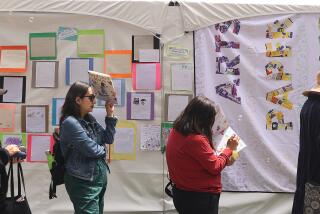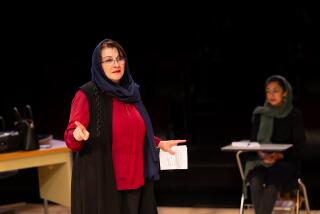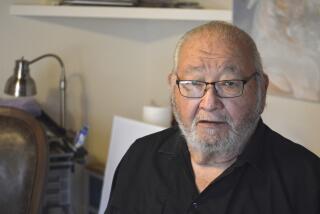Wakako Yamauchi, celebrated Japanese American playwright, dies at 93
Wakako Yamauchi was living behind barbed wire, poring over books in a tar paper-covered barrack that doubled as a library, when she discovered the depth of her love of literature.
She was a 17-year-old Nisei, or second-generation Japanese American, confined with her family to the Poston internment camp in Arizona. They were among the 120,000 Japanese and Japanese Americans imprisoned by the U.S. government in such centers during World War II as part of a policy that a 1983 congressional commission condemned as a “grave injustice,” spurred by “racial prejudice, war hysteria and failure of political leadership.”
As a writer, Yamauchi would call upon her experiences of internment, poverty, racism and resilience in works that made her one of the most noted Asian American playwrights of her generation. She died Aug. 16 at her home in Gardena at 93. The cause was cardiac arrest, said her granddaughter, Alyctra Matsushita.
Yamauchi began writing in her 20s but endured serial rejection before her writings reached mainstream audiences. Her most celebrated work, “And the Soul Shall Dance,” sprang from her youth as the daughter of itinerant immigrant farmers in California, extracting from the land the most meager of livings during the Depression.
The work, sometimes described as a Japanese “Grapes of Wrath,” centered on two families — one that is managing to adapt to life in the new country and another that feels pulled back to the old one.
It was published as a short story and anthologized in “Aiiieeeee! An Anthology of Asian-American Writers” in 1974. She then re-crafted her story as a play. The theatrical version had its premiere in Los Angeles by the East West Players in 1977, then aired the next year as a PBS film and was staged in 1979 at New York’s La MaMa theater, a hub of avant-garde works.
“The land is hard, the community is hostile, the Depression is upon them,” reviewer John Corry wrote in the New York Times. “All this, however, is incidental; the play is about the life and death of dreams.”
“The strength of the play,” Corry continued, is that Yamauchi wrote “from neither self-pity nor ideology. The internment of 1942 awaits her characters, but that tragedy exists in our minds, and not in anything said on stage. This deepens our feelings, without ever romanticizing them.”
Yamauchi attracted notice particularly for her nuanced depiction of Japanese women. Theater critic Stephen Holden, also writing in the New York Times, compared one of the play’s protagonists, Emiko, to a “Japanese American answer to one of Tennessee Williams’s haunted wraiths.”
Yamauchi returned to the lives of Depression-era Japanese farmers in her play “The Music Lessons,” about a widowed farmer whose hired laborer, once an aspiring violinist, provides music lessons to the woman’s daughter.
Her theatrical work “The Memento” centered on former girlhood friends — and their simmering rivalry over a man — and featured flashbacks to the life of a geisha. Yamauchi’s play “12-1-A” took its title from her family’s address at the internment camp.
Yamauchi also published two collections of writings, “Songs My Mother Taught Me: Stories, Plays, and Memoir” and “Rosebud and Other Stories.”
Reviewing the first volume in the New York Times, writer David Galef observed that the book’s theme is “relocation: not just the hard lives of immigrant Japanese in Depression-era America, but the subsequent internment of thousands of Japanese Americans during World War II. On a deeper level, these stories, plays and bits of memoir all involve a dislocation of the heart.”
Wakako Nakamura was born in Westmorland, Calif., in 1924. Her birth certificate gave her birth date as Oct. 25, her granddaughter said, but her family believed that she was born two days earlier. Besides their tenant farming, her parents ran a boardinghouse in Oceanside, which they were forced to abandon when their interment began.
“You couldn’t run away from it because you’d die in the desert,” she once told an interviewer of the camp. “If you escaped the bullets from the sentries.”
She said she loved words for “the sounds they made and the places they took” her. At the internment camp library, she discovered the works of the early 20th century American novelist Thomas Wolfe, who “taught me not to be afraid of what I feel,” she recalled, according to a profile in the publication the Thomas Wolfe Review. “Not the pain, not the sorrow, nor yearning or need. Nor the joy.”
Yamauchi, who had worked on a newspaper published at Poston, pursued a career as an artist before turning to writing. Her earliest works appeared in the Rafu Shimpo, a Japanese-English newspaper based in Los Angeles’ Little Tokyo.
She credited Mako, the Japanese-born actor and co-founder of East West Players, with encouraging her to adapt “And the Soul Shall Dance” from short story to the stage.
Yamauchi’s marriage to Chester Yamauchi ended in divorce, and their daughter, Joy Yamauchi, died in 2014. Besides her granddaughter, survivors include a sister and a grandson.
“There are only a few stories that I’ve ever wanted to tell,” Yamauchi told MELUS, a publication of the Society for the Study of the Multi-Ethnic Literature, two decades ago.
“I wanted to record our lives so they wouldn’t be lost. I didn’t realize what a responsibility that was. I only wanted to put down a few footprints of our sojourn here, at this time, in this place.”
Langer writes for the Washington Post.
More to Read
Start your day right
Sign up for Essential California for the L.A. Times biggest news, features and recommendations in your inbox six days a week.
You may occasionally receive promotional content from the Los Angeles Times.






